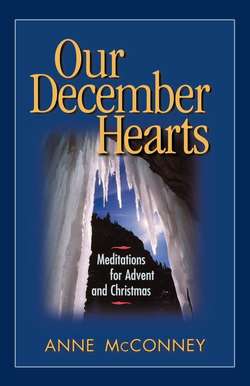Читать книгу Our December Hearts - Anne McConney - Страница 13
На сайте Литреса книга снята с продажи.
DECEMBER 4 THE CALL OF THE UNWILD
ОглавлениеThere was a year, and not too long ago, when I happened to be unemployed except for a small part-time job that fell woefully short of even beginning to pay my bills. I was frantic and battered and perilously close to defeated.
I had one extravagance, and everyone who has ever been on the thin edge of broke will know how much of an extravagance it was. I went out each Saturday morning quite early and bought a cup of coffee and a doughnut. I then drove to a nearby park where there was a small lake. I sat in the car and ate my doughnut and watched the geese and gulls and ducks, and when I had finished my own breakfast, I fed them some of the day-old bread I bought every Friday at a bakery thrift shop.
I was not, of course, the only one to perform this Saturday ritual. Young mothers arrived with toddlers in tow, impeccable old gentlemen in Norfolk jackets—and sometimes in three-piece suits—came to take the sun on the park benches, earnest joggers thumped past. Nearly all came carrying bags of torn-up bread; even the joggers seemed to plan their runs to end at the lake. Feeding waterfowl was a sociable event.
The appearance of a human form on the lake shore was a signal to every winged creature in sight; a few would even mount sentry duty beside the car. These would pounce on the first crumb and the rest would come—winging, swimming, waddling—to get in on the handout. Some of the geese were so bold that, if you didn't toss the bread quickly enough, they would tweak it irascibly out of your fingers. For a time the lake became home to a bachelor swan. This creature's head came up to my shoulder, and he had no compunction about thrusting that head through the car window and giving an outraged “Aaannk” if he thought I dallied.
So feeding these raucous, demanding mendicants became important to me. I knew why and I knew that one day feeding them would still be fun but would never be important in quite that way ever again.
The geese were Canadas, surely the most elegant of all geese with their black heads and neat white chin straps. Hearing a flock of migrating Canadas overhead is the quintessential sound of wildness, just as the crying of gulls is the quintessential sound of the sea, but the birds I fed in the park could scarcely be called wild. Somewhere along the way they had opted for the manmade lake and the easy handouts; most no longer bothered to migrate.
Yet somehow, even so, they managed to carry, however faintly, the aura of cold skies and unknown waters and the wild north, and thus they became for me a small corner of freedom at a time when very little freedom seemed available. It was a time when I prayed for the right job, and then for a good job, and finally for any job at all, a time when worry became my work. In those days I explored what it is to be unfree, not by political tyranny or by act of another, but simply by the hard reality of the world.
Eventually, of course, I found a job, though it was not one I wanted or would have chosen; it took me a long time to realize that it was a good job, and even longer to discover that it was, in God's wisdom, the right job, one that led me to places and thoughts I would never have known without it.
All that is past, yet I remember the geese and the gulls, the ducks and the cantankerous swan: the wild creatures who were no longer wild.
I remember them because I think we are so much like them. We too live our domestic lives, build our nests and raise our young. We walk the round of daily chores and receive our handouts, earned and unearned. And in the midst of it, by some uneasy whispering of the soul, we also know that we are wild and free, that our destiny lies beyond the park and the world and all the troublesome small exigencies of life.
The soul is a wild goose, flying free in the sweet clean air.
